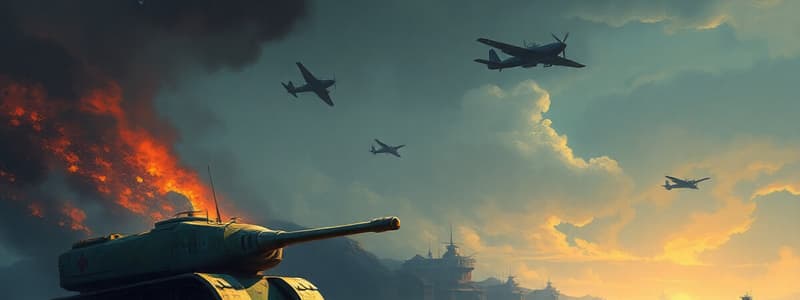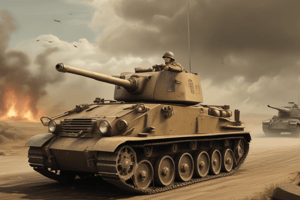Podcast
Questions and Answers
Which factor contributed to Germany's loss in the Battle of Britain?
Which factor contributed to Germany's loss in the Battle of Britain?
- French support for Germany
- Germany's superior numbers
- The weather conditions
- Britain’s new radar technology (correct)
Operation Barbarossa was an invasion of the USSR primarily motivated by a desire for supplies, oil, and land.
Operation Barbarossa was an invasion of the USSR primarily motivated by a desire for supplies, oil, and land.
True (A)
What event marked the beginning of the end of World War II for Europe?
What event marked the beginning of the end of World War II for Europe?
D-Day
The Battle of __________ was a significant turning point for the USSR as it marked the first German defeat.
The Battle of __________ was a significant turning point for the USSR as it marked the first German defeat.
Match the following events with their significance:
Match the following events with their significance:
What role did Alan Turing play during the Battle of the Atlantic?
What role did Alan Turing play during the Battle of the Atlantic?
The government portrayed the Dunkirk evacuation solely as a failure.
The government portrayed the Dunkirk evacuation solely as a failure.
What was the main reason Japan bombed Pearl Harbour?
What was the main reason Japan bombed Pearl Harbour?
Flashcards
Dunkirk Evacuation
Dunkirk Evacuation
In 1940, the British army was trapped on the French coast by the advancing German army. Operation Dynamo, which involved a diverse fleet of ships, helped rescue over 300,000 soldiers. The evacuation was a major success, though it was a desperate situation, the government presented it as a victory to boost morale.
Battle of Britain
Battle of Britain
A major air battle fought in 1940 over the skies of Britain, between the Royal Air Force (RAF) and the Luftwaffe (German air force). Britain's radar technology, skilled pilots, and tactics led to their victory.
Operation Barbarossa
Operation Barbarossa
Germany's invasion of the Soviet Union (USSR) in 1941. This invasion was part of Hitler's goal of conquering Europe, and it was a major turning point in World War II. The harsh winter and the fierce resistance from the Soviet people led to the Germans' eventual failure.
Battle of Stalingrad
Battle of Stalingrad
Signup and view all the flashcards
D-Day
D-Day
Signup and view all the flashcards
Enigma Code
Enigma Code
Signup and view all the flashcards
Pearl Harbor
Pearl Harbor
Signup and view all the flashcards
Hiroshima and Nagasaki
Hiroshima and Nagasaki
Signup and view all the flashcards
Study Notes
World War II Key Events
- Dunkirk (1940): German forces rapidly pushed Allied troops to the French coast, trapping them. Operation Dynamo saw a massive effort by various vessels (Royal Navy ships, pleasure steamers, fishing boats) to evacuate the troops. The British government promoted the event as a great success to boost national morale.
Battle of Britain (1940)
- Germany controlled much of northwestern Europe, with only the UK remaining at war.
- Germany's defeat was due to several factors, including: British radar technology, superior RAF planes, dedicated British pilots, effective British tactics, and industrial strength/support from around the world.
Soviet Union (USSR)
- Operation Barbarossa (1941): Germany invaded the Soviet Union (USSR) for resources (supplies, oil, land), aiming to control Europe and to eliminate communism.
- The German invasion was hampered by the harsh winter.
- The invasion was a major turning point as it exhausted German forces and brought the USSR into the Allied side.
- The Battle of Stalingrad became a significant turning point, marking the first major German defeat and initiating the Soviets' push back.
D-Day (1944)
- Allied forces landed on Normandy beaches, tricking Germany into thinking the main invasion was at Calais.
- D-Day marked a critical turning point in World War II, representing the start of the end of the conflict.
- The US played a large role, providing weapons and supplies that helped the Allies achieve victory.
Alan Turing and the Battle of the Atlantic
- Alan Turing's work on The Bombe: Turing's work aided in decoding German Enigma code messages used by U-boats during the Battle of the Atlantic.
- U-boats posed a significant threat, targeting Allied supply ships.
- This decryption significantly aided the Allies.
Japan and the Pacific
- Pearl Harbor (1941): Japanese forces attacked Pearl Harbor, a US naval base, causing significant damage and casualties. This was done due to Japan's expansionist goals and its desire to secure resources, considering the US a threat.
- This attack led to the US declaring war on Japan. Japan's stated motive was securing resources by invading other countries.
- Possible knowledge of a possible attack by the US government is a disputed fact.
- Atomic Bombs (1945): The US dropped atomic bombs on Hiroshima and Nagasaki, causing vast destruction and ultimately leading to Japan's surrender.
- Hiroshima bombing occurred on August 6, 1945, destroying 90% of the city; Nagasaki bombing was August 9th, 1945. Japan surrendered on August 14, 1945.
Studying That Suits You
Use AI to generate personalized quizzes and flashcards to suit your learning preferences.




